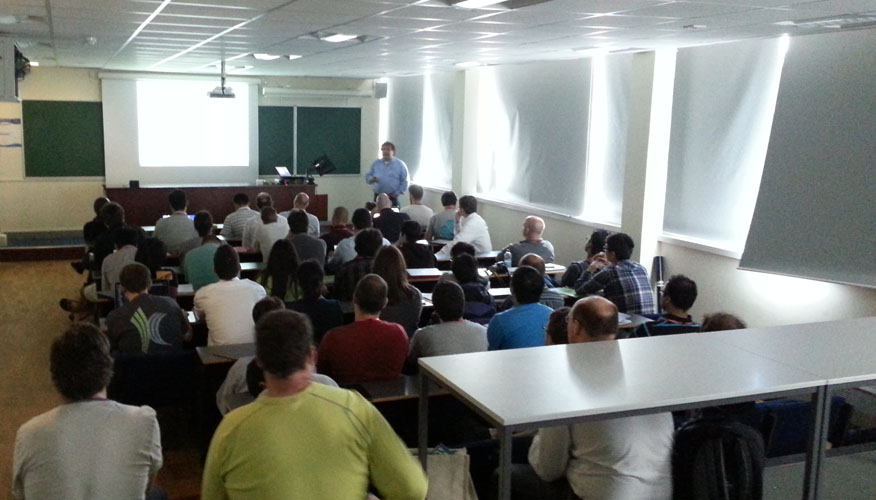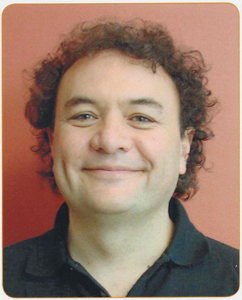Best Paper Award
The best paper award (a NVIDIA Quadro K6000) went to:
Parallel Progressive Mesh Editing by Evgenij
Derzapf, Nico Grund and Michael Guthe -- congratulations!

The keynote of Valerio Pascucci at EGPGV
|
Program
Find the schedule below the keynote speakers!
Keynotes

|
The Big Gift of Big Data
Abstract
We live in the era of Big Data, which is characterized by an unprecedented increase in information generated from many sources including (i) massive simulations for science and engineering, (ii) sensing devices for experiments and diagnostics, and (iii) records of people's activities left actively or passively primarily on the web. This is a gift to many disciplines in science and engineering since it will undoubtedly lead to a wide range of new amazing discoveries. This is also changing the nature of scientific investigation, combining theory, experiments, and simulations with the so-called "fourth paradigm" of data-driven discovery. Interdisciplinary work, traditionally confined to a few heroic efforts, will become a central requirement in most research activities since progress can only be achieved with a combination of intense computing infrastructures and domain expertise. For example, computational efforts can only validated in the proper application context, such as in climate modeling, biology, economics, and social sciences, to name just a few.
In this talk I will discuss some of the experiences in Big Data discovery that have driven the activities at the Center for Extreme Data Management Analysis and Visualization. The technical work, for example, is systematically reshaped to involve integrated use of multiple computer science techniques such as data management, analytics, high performance computing, and visualization. Research agendas are motivated by grand challenges, for instance, the development of new, sustainable energy sources, or predicting and understanding climate change. Furthermore, such efforts rely on multi-disciplinary partnerships with teams that extend across academia, government laboratories and industry. Overall, the great opportunities of Big Data research come with great challenges in terms of how we reshape scientific investigation, collaborations across disciplines, and how we educate the future generations of scientists and engineers.
About the speaker
Valerio Pascucci is the founding Director of the Center for Extreme Data Management Analysis and Visualization (CEDMAV) of the University of Utah. Valerio is also a Faculty of the Scientific Computing and Imaging Institute, a Professor of the School of Computing, University of Utah, and a Laboratory Fellow, of PNNL. Before joining the University of Utah, Valerio was the Data Analysis Group Leader of the Center for Applied Scientific Computing at Lawrence Livermore National Laboratory, and Adjunct Professor of Computer Science at the University of California Davis. Valerio's research interests include Big Data management and analytics, progressive multi-resolution techniques in scientific visualization, discrete topology, geometric compression, computer graphics, computational geometry, geometric programming, and solid modeling. Valerio is the coauthor of more than one hundred refereed journal and conference papers and has been an Associate Editor of the IEEE Transactions on Visualization and Computer Graphics.
|

|
Application Performance on the HPC Wales Infrastructure - Materials Science, Chemistry and Nanoscience
Abstract
The need for computational materials and chemistry codes to utilize effectively high-end computing platforms is often taken as read; however, there is little doubt that this presents a major challenge for the discipline. This challenge is articulated in a recent update to the the Scientific case for HPC in Europe, entitled "The Scientific Case for High Performance Computing in Europe 2012-2020; from Petascale to Exascale". The wide-ranging report captured the current and expected future needs of the scientific communities through the conclusions of five sector-based panels. We focus here on the needs in Materials Science; while Exaflop machines are essential and higher computational power will enable significantly increased accuracy, some important fields will be limited by throughput and data management.
Just as the drive to exascale platforms remains an elusive goal, so commodity-based clusters continue to provide a cost effective solution for the material scientist and computational chemist. Detailed cluster architecture - node and interconnect - determines the ability of such clusters to address the differing demands from the fields of capability and capacity computing. We consider the performance of a number of key codes - NWChem, GAMESS-UK, ONETEP, CASTEP, Quantum Espresso, CP2K, DLPOLY and GROMACS - on a variety of HPC systems. We identify the challenges in scaling to large processor counts and the associated bottlenecks.
Finally, just as performance is perhaps the key metric for experienced practitioners, so to the novice user ease-of-use is arguably of greater importance, with the availability of web-based scientific gateways providing an essential tool. We consider the availability of such resources as part of the High Performance Computing (HPC) Wales service in the UK. Funded to provide computational services to industry and SMEs in particular, we outline the services provided to the Advanced Materials and Manufacturing communities.
About the speaker
Professor Martyn Guest is Technical Director of HPC Wales and has been Director of Advanced Research Computing (ARCCA) at Cardiff University since 2007. Over the past thirty years, he has led a variety of high performance and distributed computing initiatives, from his role as coordinator of SERC's Distributed Computing Initiative in the late 1980s, to Leader of the Terascale Applications Team within the UK's National HPCx Facility from 2002. He spent three years as Senior Chief Scientist and Technical Group Leader of the High Performance Computational Chemistry Group at the Pacific Northwest National Laboratory (Washington, USA), before returning to the UK in 1995 as Associate Director of the Computational Science and Engineering Department (CSED) at the STFC Daresbury Laboratory.
Martyn is a founder member of EPSRC's Technology Watch Panel (TWP), a member of the corresponding Applications Panel (AP), and has provided advice to a wide variety of agencies and organisations in both the UK (Research Councils, AWE, GCHQ) and abroad - NSF and DOE (USA), NSERC (Canada), CHPC (South Africa), ICHEC (Ireland). His research interests cover a variety of topics in the development and application of computational chemistry methods on high performance computers. He is lead author of the GAMESS-UK electronic structure program, and has written or contributed to more than 240 articles.
|
Schedule
Monday, June 9
|
9:15
|
Opening and Welcome
|
|
9:30
|
Session 1: Distributed Systems
A Study of
Parallel Data Compression Using Proper Orthogonal Decomposition on the K
Computer
Chongke
Bi, Kenji Ono, Kwan-Liu Ma, Haiyuan Wu, Toshiyuki Imamura
Collaborative
High-Fidelity Rendering over Peer-to-Peer Networks
Keith
Bugeja, Kurt Debattista,Sandro Spina, Alan Chalmers
|
|
10:30
|
Coffee Break
|
|
11:00
|
Keynote 1
Application Performance on
the HPC Wales Infrastructure-Material Science, Chemistry and Nanoscience
Martyn Guest
|
|
12:30
|
Lunch
|
|
14:00
|
Session 2: Parallel
Graphics
Parallel
Methodologies for a Micropolygon Renderer
Mark A. Bolstad
Clustered
Pre-convolved Radiance Caching
Hauke
Rehfeld, Tobias Zirr,Carsten Dachsbacher
Parallel
Progressive Mesh Editing
Evgenij
Derzapf, Nico Grund , Michael Guthe
|
|
15:30
|
Coffee Break
|
|
16:00
|
Session 3: Parallel Processing
Finely-Threaded
History-Based Topology Computation
Robert
Miller, Kenneth Moreland, Kwan-Liu Ma
Freeprocessing Transparent in situ
visualization via data interception
Thomas
Fogal, Fabian Proch, Alexander Schiewe,Olaf Hasemann, Andreas Kempf, Jens Krüger
|
|
17:30
|
Welcome Ceremony and Reception
|
Tuesday, June 10
|
9:00
|
Session 4: GPU Techniques
and Sound
Auto-Tuning
Complex Array Layouts for GPUs
Nicolas Weber,
Michael Goesele
Performance
Modeling of v13 Volume Rendering on GPU-Based Clusters
Silvio
Rizzi, Mark Hereld, Joseph
Insley, Michael E. Papka, Thomas Uram, Venkatram Vishwanath
Precomputing
Sound Scattering for Structured Surfaces
Gregor Mückl ,
Carsten Dachsbacher
|
|
10:30
|
Coffee Break
|
|
11:00
|
Keynote 2
The Big Gift of Big Data
Valerio Pascucci
|
|
12:00
|
Closing and Best Paper
Award
|
|
12:30
|
Lunch
|
|